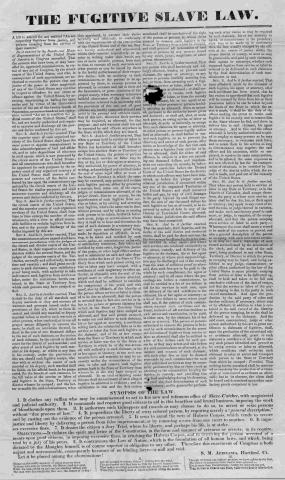Image

Description
The Fugitive Slave Law of 1850 made it illegal for anyone in the north to assist fugitive slaves in their escape for freedom. This law added further provisions to the 1793 Fugitive Slave Act regarding runaways and levied even harsher punishments for interfering in their capture. Both laws were repealed by an act of Congress in 1864.
Transcript of the Fugitive Slave Law
Source-Dependent Questions
- According to section 5, what is a marshal liable for if a person escapes their custody?
- Based on the information provided in section 5, how is a U.S. citizen impacted by this law?
- According to section 7, what are the consequences for interfering with the capture of a fugitive?
- Describe the confliction for northerners based on section 9.
Citation Information
"The Fugitive Slave Law," Hartford, Connecticut, 1850. Courtesy of Library of Congress